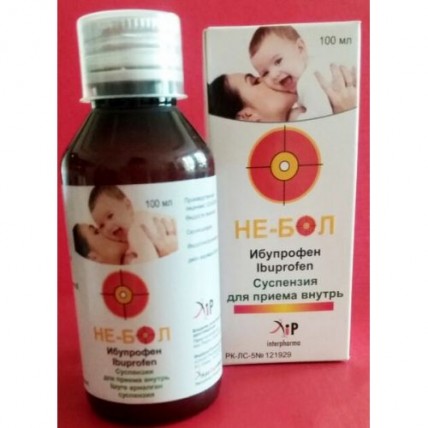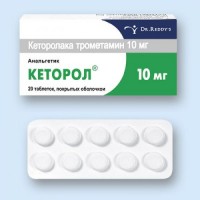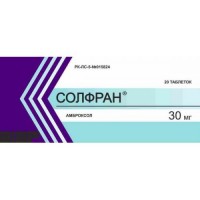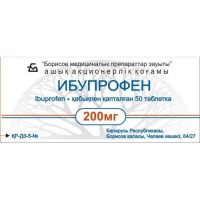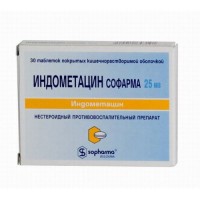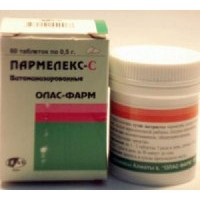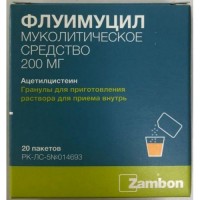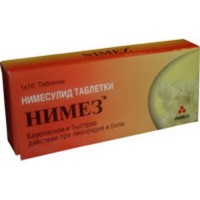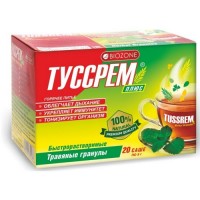Non-bol 100 mg / 100 ml 5 ml oral suspension
- $6.60
The instruction for medical use of Ne-Bol Torgovoye medicine Ne-Bol name the International unlicensed name Ibuprofen Dosage Form Suspension for intake of 100 mg / 5 ml Structure of 5 ml of drug contains active agent: ibuprofen of 100 mg excipients: polysorbate 80 (Twin-80), sodium methylparahydroxybenzoate, sodium propilparagidroksibenzoat, Natrium benzoicum, sucrose, glycerin, silicon colloidal anhydrous (aerosil), anhydrous citric acid, dye cochineal red crimson 4R (E124), essence orange liquid, sodium of a kroskarmelloz, aspartame, sodium hydroxide, water purified. The description Suspension of pink color with taste of orange. Pharmacotherapeutic group Anti-inflammatory and antirheumatic drugs. Non-steroidal anti-inflammatory drugs. Propionic acid derivatives. Ibuprofen. ATX M01AE01 code the Pharmacological Pharmacokinetics Ibuprofen properties quickly and almost is completely soaked up from digestive tract. Peak values of concentration in blood plasma are reached approximately in 1-2 hours after reception. The ibuprofen for 90-99% contacts proteins of plasma and has elimination half-life 2 hours. It is intensively metabolized in a liver and quickly removed with urine (80%), mainly, in the form of metabolites and their conjugates. The ibuprofen in insignificant quantity is allocated in breast milk. The pharmacodynamics the Ibuprofen renders anti-inflammatory, analgeziruyushchy and febrifugal effect. Shows the action by cyclooxygenase enzyme suppression that causes considerable decrease in level of prostaglandins playing a significant role in pathogenesis of inflammation, pain and fever. Analgeziruyushchy action is caused by two mechanisms: peripheral (through suppression of synthesis of prostaglandins) and central (through suppression of synthesis of prostaglandins in the central and peripheral nervous system). The ibuprofen reduces sensitivity of vessels to bradykinin and a histamine, influences production of lymphokine in T lymphocytes and also suppresses vasodilatation, inhibits aggregation of thrombocytes. The period prior to analgeziruyushchy action is 30 minutes, the maximum febrifugal action is reached within 2 – 4 hours. Febrifugal action lasts for 4 – 8 hours or more, analgeziruyushchy action lasts till 4 - 6 o'clock. Indications - symptomatic treatment of a pain syndrome of light and average intensity: the headache, a toothache, painful periods, neuralgia, muscular, rheumatic and other types of pain - flu and catarrhal diseases the Route of administration and doses to Adults and children of 3 months is also more senior recommend: Less than 5 kg are not recommended to children with body weight. The maximum daily dose should not exceed 30 mg on kg of body weight of the child a day. The interval between doses has to make 6-8 hours. Babies of 3-6 months: on 2.5 ml three times a day. Babies of 6-12 months: on 2.5 ml three times a day Children of 1-2 years: 2.5 ml 3-4 times a day Children of 3-7 years: 5 ml 3-4 times a day Children of 8-12 years: 10 ml 3-4 times a day Adults: 200-400 mg take each 4-6 hours the Drug inside after a meal. Drug is intended only for short-term use in no more than 3 days. Side effect Is frequent - a bronchospasm, an asthma, a headache, dizziness, insomnia, excitement, irritability or fatigue, - gastrointestinal ulcers, heartburn, an abdominal pain, nausea, vomiting, a meteorism, diarrhea, abdominal pains, gastrointestinal and other bleedings Sometimes - decrease in hearing, a ring or sonitus - disorders of vision, a diplopia, dryness and irritation of eyes, a chemosis and a century (allergic genesis) - skin rash, an itching, a small tortoiseshell and also asthma attacks (sometimes with falling of arterial blood pressure), sweating strengthening - hypostasis, especially at patients with an arterial hypertension or a renal failure, a nephrotic syndrome, interstitial nephrite Very seldom - changes of a picture of blood (anemia, a Werlhof's disease, a leukopenia, thrombocytopenia, a pancytopenia, an agranulocytosis) - drowsiness, a depression, confusion of consciousness, a hallucination - heart failure, hypertensia, tachycardia - abnormal liver functions - exacerbation of nonspecific ulcer colitis and Crohn's disease - aseptic meningitis (it is frequent at patients with autoimmune diseases) - an esophagitis, pancreatitis, hepatitis - an acute renal failure, papillonekroz, especially at prolonged use, in combination with increase in level of urea in blood and appearance of hypostases - bullous skin reactions, anaphylactoid reactions, an acute anaphylaxis, fever, such as Stephens-Johnson's syndrome, and toxic epidermal necrosis (scalded skin syndrome), an alopecia, allergic rhinitis - digestive tract erosive cankers (in some cases are complicated by perforation and bleeding), irritation, dryness of a mucous membrane of an oral cavity or mouth pain, an ulceration of a mucous membrane of gums, aphthous stomatitis, anorexia. According to preclinical, clinical, epidemiological trials and epidemiological data, prolonged use of an ibuprofen, especially in high doses (2400 mg a day), can be connected with small increase in risk of development of trombotichesky complications (for example, a myocardial infarction or a stroke). Contraindications - hypersensitivity to drug components - the hypersensitivity to acetylsalicylic acid and other non-steroidal anti-inflammatory drugs which is shown in the form of asthma, urticaria or other allergic reactions - the gastrointestinal bleedings or perforation in the anamnesis connected with the previous treatment with use NPVP, hemorrhagic diathesis, a prothrombinopenia, hemophilia - gastrointestinal bleeding, a recurrent round ulcer (two or more accurately expressed an episode of the proved ulcer or bleeding), Crohn's disease - bronchial asthma - disturbance of a hemopoiesis and hemocoagulation - heavy heart failure - a heavy course of arterial hypertension - a state after performing aortocoronary shunting - deficiency of vitamin K - cerebral and vascular or other bleedings - the confirmed hyperpotassemia - inflammatory bowel diseases - diseases of an optic nerve, scotoma, an amblyopia, disturbance of color sight - pathology of a vestibular mechanism, decrease in hearing - deficit glyukozo-6-fosfatdegidrogenazy - portal hypertensia, - heavy abnormal liver functions or kidneys, at reduction in the rate of glomerular filtration less than 30 ml/min. - children's age up to 3 months - the third trimester of pregnancy and the period of a lactation With care: - advanced age - a cytopenia (leukopenia and anemia) Medicinal interactions At simultaneous use of Ne-Bola with anticoagulants strengthening of their action is possible, at reception with kaliysberegayushchy diuretics – the hyperpotassemia is possible, with glucocorticoid drugs, other non-steroidal anti-inflammatory drugs – risk of development of side effects from digestive tract increases. Ne-Bol is reduced by effect of diuretics and antihypertensive drugs. Simultaneous use of barbiturates, anticonvulsants, rifampicin and alcohol with Ne-Bolom increases risk of hepatotoxic action. The activity of a zidovudine at reception of Ne-Bola can decrease. Ne-Bol increases concentration of digoxin, Phenytoinum, a methotrexate, lithium in blood plasma. Joint intake of acetylsalicylic acid and Ne-Bola leads to decrease in level of an ibuprofen in blood plasma. The concomitant use of a probenetsid can change concentration of paracetamol in plasma and its removal. Holestiramin reduces drug absorption. Domperidon and metokloramid increase absorption of Ne-Bola. Special instructions in order to avoid development of erosive cankers of digestive tract drug should be accepted after a meal. The interval between receptions has to make not less than 4 hours. Impact on digestive tract At reception of any NPVP is possible development of gastrointestinal bleeding, ulcer or perforation which can become deadly, these side effects can develop during treatment, with the warning symptoms or without those at any time (is more often in case of the severe damages of a GIT which are available in the anamnesis). The risk of developing of gastrointestinal bleeding, ulcer or perforation becomes higher at increase in a dose of NPVP at patients with a peptic ulcer in the anamnesis, in particular, if it was complicated by bleeding or perforation and also at elderly people. Such patients have to begin treatment with the minimal effective dose. For patients who need constant use of low doses of acetylsalicylic acid or other drugs which increase risk of damage of a GIT it is necessary to carry out treatment under cover of supportive applications (such as mizoprostol or inhibitors of the protonew pump). Patients with damage of a GIT owing to reception of NPVP in the anamnesis, in particular elderly, have to report to the doctor about any unusual abdominal symptoms (in particular gastrointestinal bleeding), especially at the initial stages of treatment. It is recommended to observe precautionary measures at the patients who are at the same time taking the drugs which can increase risk of developing an ulcer or bleeding, for example, oral corticosteroids, anticoagulants (warfarin), selective serotonin reuptake inhibitor or aspirin. In case of gastrointestinal bleeding or an ulcer, at the patients accepting an ibuprofen it is necessary to stop treatment. NPVP should be taken with caution to patients with gastrointestinal diseases such as ulcer colitis, Crohn's disease in the anamnesis as reception of NPVP can lead to deterioration in their state. Impact on a cardiovascular system Is recommended to observe precautionary measures at patients with arterial hypertension and (or) heart failure as in connection with therapy of NPVP cases of a delay of liquid and hypostases were noted. According to clinical and epidemiological trials some NPVP (especially in high doses and at long-term treatment) can increase risk of arterial trombotichesky complications (such as, a myocardial infarction or a stroke). During the epidemiological researches the interrelation between the increased risk of a myocardial infarction with reception of low doses of an ibuprofen was not revealed (1200 mg a day). Patients with uncontrollable arterial hypertension, heart failure with developments of stagnation, chronic coronary heart disease, atherosclerosis of peripheral arteries and (or) cerebrovascular diseases have to receive treatment by an ibuprofen, only after studying a ratio advantage/risk. Similar thorough examination of a question of prescribing of drug, is required before long-term treatment of patients with risk factors of developing a cardiovascular disease (for example, an arterial hypertension, a lipidemia, diabetes, smoking). Additional precautionary measures the Raised precautionary measures are necessary at patients: - with a renal and liver failure, - having asthma, - a system lupus erythematosus and other diseases of connective tissue (risk of developing of aseptic meningitis). For patients with a high risk at dysfunction of heart and kidneys, treatment with diuretics, hydropenias of any etiology, recommend observation of renal function. In case of appearance of disorders of vision, the obscured sight, scotoma or disturbances of color perception it is necessary to stop treatment. Treatment also has to be stopped in case of a persistent abnormal liver function or in case of clinical symptoms of a liver failure. At long-term treatment the observation for gemogrammy and periodic check of function of a liver is recommended. At the patients accepting anticoagulants of coumarinic type, parameters of blood coagulation should be controlled more often. It is also reasonable to control sugar level in blood from time to time. Heavy skin reactions some of which deadly, including exfoliative dermatitis, a malignant exudative erythema (Stephens's syndrome - Johnson) and a toxic epidermal necrolysis in connection with reception of NPVP were noted very seldom. More often these reactions develop at the initial stage of treatment: the beginning of reaction, falls on the first month of treatment. It is necessary to stop administration of drug at the first manifestation of skin rash, injuries of mucous membranes or any other sign of hypersensitivity. Intake of inhibitors of cyclooxygenases / inhibitors of synthesis of prostaglandins can make negative impact on female fertility because of impact on an ovulation. This influence reversibly also disappears after the treatment termination. At the women having problems with conception and at identification of the true cause of infertility, it is necessary to consider need of use of an ibuprofen. Use for children Exists risk of a renal failure at the dehydrated children. The ibuprofen should not be given to children aged 3 months and also to children with body weight less than 5 kg as there is no sufficient experience of use of an ibuprofen in this age group are younger. Patients with rare hereditary problems of intolerance of fructose should not take this drug. The period of pregnancy and feeding by a breast Oppression of synthesis of prostaglandins can make an adverse effect on pregnancy and (or) development of an embryo or fruit. Data of epidemiological researches indicate the increased risk of termination of pregnancy, development of heart disease and a gastroshizis after intake of inhibitors of synthesis of prostaglandins at early stages of pregnancy. The absolute risk of anomalies of a cardiovascular system increases from less than 1% to 1.5%. The risk increases at increase in a dose and duration of treatment. During the third trimester of pregnancy all inhibitors of synthesis of prostaglandins make the following impact on a fruit: - cardiopulmonary toxicity (with premature closing of an arterial channel and pulmonary hypertensia), - renal dysfunction which can progress up to a renal failure with oligogidroamniony. A condition of mother and a fruit at the end of pregnancy: - perhaps, increase in a bleeding time, anticoagulative action which can be noted even at very low doses, - reduction of sokratitelny uterine activity that can lead to decrease of the activity of patrimonial activity or its delay. Owing to these facts the administration of drug is contraindicated during the third trimester of pregnancy. It is not necessary to take the drug at pregnancy and to women, trying to become pregnant. The ibuprofen and its metabolites in a small amount get into maternal milk. As now data on negative influence on children of chest age are absent, there is no need for the termination of breastfeeding at short-term administration of drug in therapeutic doses. Features of influence of medicine on ability to run the vehicle or potentially dangerous mechanisms Considering a possibility of development of such side reactions as dizziness, drowsiness, deterioration in development of sight, confusion of consciousness it is necessary to be careful during the driving or work with driving mechanisms. Overdose So far about cases of overdose of the drug Ne-Bol it was not reported. The ibuprofen is a little toxic to cause overdose symptoms, especially in a dose less than 400 mg/kg of weight. Symptoms: nausea, vomiting, pains in anticardium, a headache. Sometimes there are a drowsiness and an ataxy. Arterial hypotonia, acidosis, a renal failure or a liver and gastrointestinal bleeding is seldom noted. Treatment - at an early stage of overdose is shown gastric lavage, it is necessary to cause vomiting, appoint activated carbon, hold the supporting events and symptomatic treatment. The form of release and packing On 100 ml of drug place in the polyethylene dark bottle corked by the screwed metal cover of silver color with laying with control of the first opening. On a bottle paste the paper self-adhesive label. On 1 bottle together with a measured glass on 10 ml and the instruction for medical use in the state and Russian languages place in a pack from cardboard. To Store storage conditions
in the place protected from light at a temperature not higher than 25 Store OS out of children's reach! 3 years not to apply a period of storage after an expiration date. Prescription status According to the prescription Lincoln Pharmaceutical Ltd Producer, India the Owner of the registration certificate of Inter Pharma, India the Address of the organization accepting in the territory of the Republic of Kazakhstan claims from consumers on quality of products (goods) of KazEvroFarm LLP Almaty, Kurmangaza St. 48 "and", office 9 the 050000 Phone number Index (727) 2729871, 2615141 Fax number (727) 2614466 E-mail:
To Develop Info@kazeuropharm.com
in the place protected from light at a temperature not higher than 25 Store OS out of children's reach! 3 years not to apply a period of storage after an expiration date. Prescription status According to the prescription Lincoln Pharmaceutical Ltd Producer, India the Owner of the registration certificate of Inter Pharma, India the Address of the organization accepting in the territory of the Republic of Kazakhstan claims from consumers on quality of products (goods) of KazEvroFarm LLP Almaty, Kurmangaza St. 48 "and", office 9 the 050000 Phone number Index (727) 2729871, 2615141 Fax number (727) 2614466 E-mail:
To Develop Info@kazeuropharm.com
